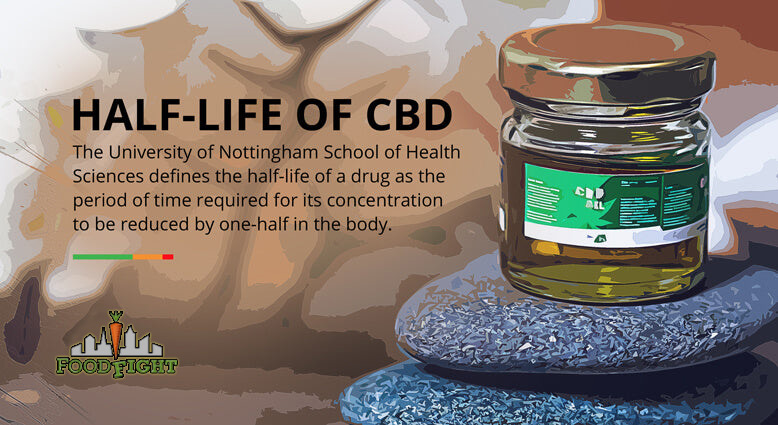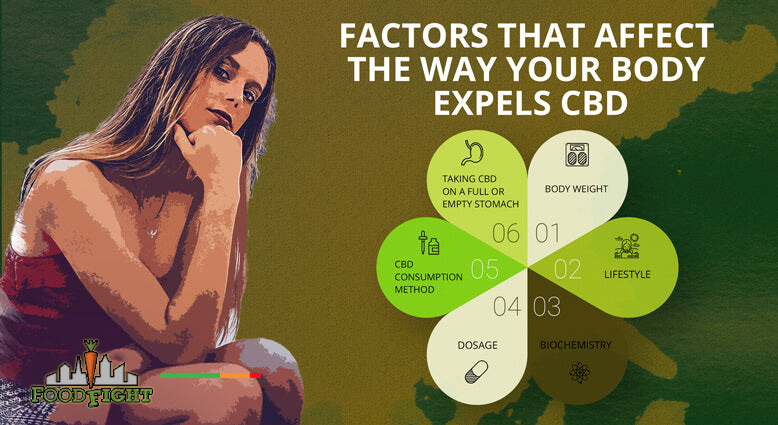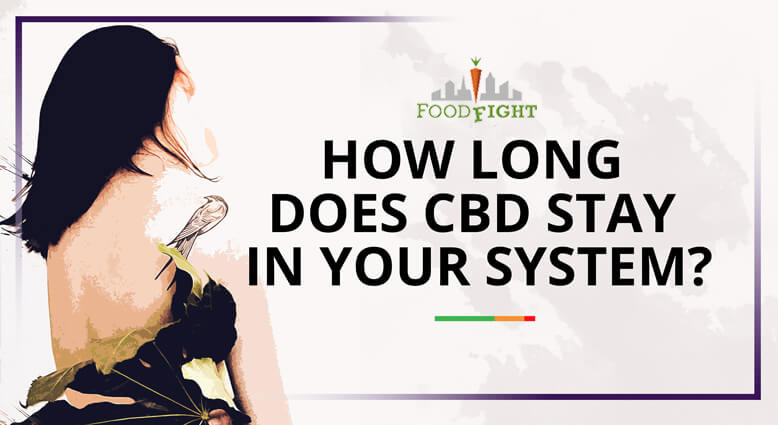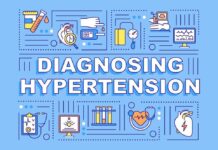Hemp-derived CBD is legal in all 50 states. But in some cases, CBD shows up as a false positive even after days of abstaining. If you are worried about an upcoming drug test, then it is important that you know how long CBD stays in the body.
There is not enough research available to determine with certainty how long CBD lasts in your system. The effects of CBD can be felt as quickly as five minutes or as long as 30 minutes – depending on how you consumed the substance. These effects typically last for about four hours.
Many people assume that after the effects of CBD have worn off, the substance is completely out of their body. This is not true. It only means that the amount of CBD has been reduced to the point that it is no longer effective but it could still take some time for your system to expel the compound.
According to research [1]Welty, T. E., Luebke, A., & Gidal, B. E. (2014, September). Cannabidiol: Promise and Pitfalls. Epilepsy Currents, 14(5), 250–252. https://doi.org/10.5698/1535-7597-14.5.250, CBD oil stays in the system for up to two days when taken orally. This estimate, however, does not take into account other factors that may affect the half-life of CBD. These variables include dosage and frequency, individual metabolism rate, age, weight, and even sex. They affect how the body processes CBD – how fast it is broken down and how soon it leaves your system.
Half-life of CBD

As defined by the University of Nottingham School of Health Sciences, a drug's half-life is the time it takes for its concentration to be reduced by one-half. [2]RLO: Pharmacology: Half-life of Drugs. (n.d.). Retrieved May 20, 2022, from https://www.nottingham.ac.uk/nmp/sonet/rlos/bioproc/halflife/index.html
Essentially, the half-life of a substance is how long it would take for your kidneys and liver to break down and filter half of the compound.
According to a 2014 study by Welty, Luebke, and Gidal, the half-life of ingested CBD is about one to two days. This means that after that period, half of the CBD has already completely left your body.
After two to three days, only around a quarter of the CBD remains. After three to six days, the CBD is completely cleared from your system.
When you consider consumption frequency, CBD can take around two to three days to leave the system of light users and three to seven days for heavy users.
Factors that affect the way your body expels CBD

How long it takes for CBD to leave your system depends on the following factors:
- Body weight
- Lifestyle
- Biochemistry
- Dosage
- CBD consumption method (inhalation, ingestion, topical, suppository)
- Taking CBD on a full or empty stomach
Body Weight
CBD and other cannabinoids can be stored in fat cells. This could mean that consumers who are on the heavy side – with high body mass indexes (BMIs) – might store excess CBD much longer than those who are able to burn fat more efficiently due to a high metabolic rate.
Lifestyle
If you have an active lifestyle and are consciously sticking to a fiber-rich diet, you might be able to expel CBD more quickly than those who live on a sedentary routine and low-fiber diet. The more amount of fat you burn, the quicker you are able to eliminate CBD. Dietary fiber also helps push fatty compounds out of the body through solid waste, so adding more fiber to your diet could accelerate clearing CBD as well.
Individual Biochemistry
Our individual biochemical environment can also affect how the body can quickly process CBD. Even if you are active and maintain a healthy BMI, you may still metabolize and clear CBD slower than others.
Dosage
One of the most important factors that could determine how long CBD stays in your system is dosage – how much CBD you consume per dose and how often you take these doses within a day. If you take CBD regularly and at high doses, you will have to wait a while for CBD to clear.
What clinical studies say
While there is no study that can categorically define the exact time CBD lasts in the body, there is one experiment that provided a time frame based on an average estimate.
Back in 1991, scientists monitored the CBD blood plasma levels of 14 patients who have been diagnosed with Huntington Disease. They were given 700mg of CBD per day over a period of six weeks.
After only one week following the administration of CBD, only 1.5 ng/ml of the compound was found in the blood of the respondents. This blood plasma level is considered virtually undetectable.
The researchers concluded that it takes about two to five days for CBD to leave the body completely, with no significant difference between genders.
The results of the study [3]Consroe, P., Kennedy, K., & Schram, K. (1991, November). Assay of plasma cannabidiol by capillary gas chromatography/ion trap mass spectroscopy following high-dose repeated daily oral … Continue reading were published in the journal Pharmacology, Biochemistry, and Behavior.
Although this clinical trial establishes a maximum time frame for the elimination half-life of CBD at one week, this may not work for everyone as the chemical make-up of the human body is unique to each individual.
How Long Do The Effects of CBD Last?
We have already discussed how the makeup, biochemistry, and metabolic rate of your body can determine the effectiveness of CBD. These features are unique to you, and you have no control over how your body composition reacts to CBD. What you can control are external factors – specifically the method of ingestion which is the most significant variable in determining how long the effects are felt and how long CBD stays in your system.
The effects of CBD only last for a few hours, even if the compound stays in your body for days. The duration of these effects depends on your mode of consumption, body composition, and prior history with CBD.
Inhaling and sublingually ingesting CBD present fast-acting effects but they are also the quickest to dissipate. CBD edibles and topical applications take longer to manifest their effects but these generally last the longest.
According to research, vaping allows 30% to 50% of the CBD to be absorbed by the body. When you take CBD sublingually, your body absorbs around 25% of CBD. If you take CBD orally and it passes down your gut, only 5% to 15% of the CBD is absorbed by the body.
CBD Consumption Methods
You can inhale CBD through smoking or vaping. You can take CBD as a tincture dropped under the tongue, or as capsule and edible ingested through the digestive tract. You can even apply CBD to your skin.
Inhalation
Smoking or vaping is a popular way of consuming CBD. Many people enjoy the relaxing effect of inhaled CBD. This is done by loading CBD-infused vape oil onto an electronically heated vaporizing device such as vape pens. The bioavailability of inhaled CBD is very high as it enters the bloodstream via the lung sacs.
When you vape CBD, you will begin to feel the effects almost immediately. These effects last around one to four hours. CBD continues to stay in your body for three to four days.
Sublingual
The sublingual method involves putting CBD under your tongue, holding it there for 30 to 90 seconds, and swallowing. CBD drops are available in tincture, spray, and concentrates form.
Sublingual drops are similar to vaping CBD when it comes to providing quick relief. CBD oil tinctures act remarkably fast and the effects are generally felt within two to five minutes after swallowing.
When you take CBD sublingually, the liquid concentrate is absorbed by the mucous membrane under the tongue and bypasses your digestive system. The CBD then travels through capillaries in the mouth tissue and reaches your bloodstream directly.
Both vaping and sublingual administration feature quick onset and a higher bioavailability compared to oral consumption. The difference is your level of comfort – if you are a nonsmoker you might want to consider sublingual drops instead of vaping.
The effects of sublingual CBD lasts four to six hours. The CBD stays in your body for three to four days.
Topical
The analgesic properties of CBD have made it a popular alternative to painkillers. The best way to achieve pain relief is to apply CBD directly to the area in your body that is swollen or bruised.
Topical CBD comes in many forms: lotions, rubs, ointment, salve, balm, and cream. Many people rub CBD on their skin to treat sore muscles, stiff joints, skin irritations, acne, wrinkles, eczema, and other skin conditions.
Topical administration is the most unique of all methods as the CBD never enters the bloodstream but stays on your skin and interacts with nearby cannabinoid receptors. This is why topical CBD has a slower onset. The upside, however, is that the effects of topical CBD last longer.
If you are taking CBD for pain, the topical method is an excellent choice. CBD will be able to target chronic localized pain and provide direct relief instead of waiting for the CBD to produce an all-body effect.
The effects of topical CBD can last five to six hours. CBD stays in your body up to five days.
Ingestion
Eating or drinking CBD is the easiest way to consume the compound. CBD in edible form comes in different shapes and sizes – capsules, gels, gummy bears, candy, coffee, cookies, butter, powder mixes, and even dog treats.
Ingesting CBD is quite popular because it is discreet, convenient, and comfortable. You can pop a CBD gummy into your mouth while walking. Add CBD to your salad dressing. Bake brownies with CBD. Mix CBD into your protein shake before a workout. The possibilities are endless!
Although CBD edibles provide you with creative ways of introducing CBD into your diet, the ingredients that you add to it can alter the absorption rate of CBD into your body.
When CBD passes through the gut, it is processed by the digestive system and then metabolized by the liver before eventually reaching the bloodstream.
Ingesting CBD has the slowest onset rate – you can only start feeling the effects around 20 minutes to up to two hours after consumption. If you prefer to eat or drink CBD, the best way to do this is to take CBD on an empty stomach.
The advantage of having CBD go through your entire digestive system is that the compound stays longer in your body. The effects of ingesting CBD can last six to eight hours. CBD stays in your body for three to five days.
Conclusion
So how long does CBD stay in your system after consumption? Keep in mind that the method of administration directly correlates to how soon CBD exits your body. If you feel the effects faster, then the CBD would leave your system sooner. Hence, CBD in vapor or sublingual form will clear your body faster than CBD in topical or edible form.
Apart from method of administration, our lifestyle, body composition and CBD dosage also affect the amount of time CBD stays in our system. But based on the clinical trial carried out on patients who took CBD, the estimation is that CBD stays in the body no longer than five days.
Research is still ongoing but hopefully scientists would be able to soon make a definitive conclusion on how long CBD stays in the body.
References
| ↑1 | Welty, T. E., Luebke, A., & Gidal, B. E. (2014, September). Cannabidiol: Promise and Pitfalls. Epilepsy Currents, 14(5), 250–252. https://doi.org/10.5698/1535-7597-14.5.250 |
|---|---|
| ↑2 | RLO: Pharmacology: Half-life of Drugs. (n.d.). Retrieved May 20, 2022, from https://www.nottingham.ac.uk/nmp/sonet/rlos/bioproc/halflife/index.html |
| ↑3 | Consroe, P., Kennedy, K., & Schram, K. (1991, November). Assay of plasma cannabidiol by capillary gas chromatography/ion trap mass spectroscopy following high-dose repeated daily oral administration in humans. Pharmacology Biochemistry and Behavior, 40(3), 517–522. https://doi.org/10.1016/0091-3057(91)90357-8 |






